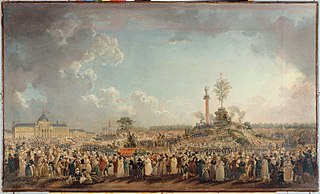Secular religion
[11] Paul Vitz applied the term to modern psychology in as much as it fosters a cult of the self, explicitly calling "the self-theory ethic ... this secular religion".[15] In addition to basic forms of politics, like parliament and elections, it also holds an aspect of "sacralization"[16] related to the institutions contained within the regime and also provides the inner measures traditionally considered to be religious territory, such as ethics, values, symbols, myths, rituals, archetypes and for example a national liturgical calendar.Scholars who have studied these phenomena include William Connolly in political science, Christoph Deutschmann in sociology, Emilio Gentile in history, Oliver O'Donovan in theology and others in psychology.Because Christianity tended to pull men away from earthly matters, Rousseau advocated a "civil religion" that would create the links necessary for political unity around the state.The Swiss Protestant theologian Adolf Keller (1872–1963) argued that Marxism in the Soviet Union had been transformed into a secular religion.Loyalty oaths or membership in a dominant (or sole) political party may be required for employment, obtaining government services, or simply as routine."[35] "This religion sacralized the state and assigned it the primary educational task of transforming the mentality, the character, and the customs of Italians.[40] A couple of years later, on the eve of World War II, F. A. Voigt characterised both Marxism and National Socialism as secular religions, akin at a fundamental level in their authoritarianism and messianic beliefs[41] as well as in their eschatological view of human History.[45] Klaus-Georg Riegel argued that "Lenin's utopian design of a revolutionary community of virtuosi as a typical political religion of an intelligentsia longing for an inner-worldly salvation, a socialist paradise without exploitation and alienation, to be implanted in the Russian backward society at the outskirts of the industrialised and modernised Western Europe.
by Pierre-Antoine Demachy
belief systemmetaphysicalmaterialliberalismanarchismcommunismnazismfascismJacobinismMaoismReligion of Humanitycults of personalityCult of ReasonCult of the Supreme BeingPaul VitzpsychologyOlympismPierre de CoubertinOlympic GamesPoliticsOutlineOutline of political scienceIndex of politics articlesPolitics by countryPolitics by subdivisionPolitical economyPolitical historyPolitical history of the worldPolitical philosophyPolitical systemsAnarchyCity-stateCollective leadershipConfessional systemDemocracyDictatorshipDirectorialFederacyFeudalismHybrid regimeMeritocracyMonarchyParliamentaryPresidentialRepublicSemi-parliamentarySemi-presidentialTheocracyPolitical sciencepolitical scientistsInternational relationstheoryComparative politicsElection sciencePolitical analysisPolitical theoryPolicy studiesPolitical psychologyPolitical sociologyPublic administrationBureaucracystreet-levelTechnocracyAdhocracyPublicPolicyPublic policydoctrineDomestic policyForeign policyCivil societyPublic interestSeparation of powersLegislatureExecutiveJudiciaryElection commissionSovereigntyPolityCountryTheories of political behaviorBiology and political orientationPolitical organisationsCritique of political economyElectoral systemsElectionsvotingUnitarismFederalismGovernmentGovernanceIdeologyCulturePolitical campaigningPolitical partiesideologiesstate religionethicsvaluessymbolsritualsarchetypesliturgicalTotalitarian societiesdemocraciesAmerican civil religionRobert Bellahcivil religionapocalypticreligionWilliam ConnollyChristoph DeutschmannsociologyEmilio GentilehistoryOliver O'DonovantheologyFounding Fathers of the United StatesspiritualtheocraticseculartranscendentalJean-Jacques RousseauAdolf KellerMarxismSoviet Union